Activist Singer Joins Ukraine Children’s Action Project
It was our 5th trip to Ukraine.
But this time, we were traveling with legendary singer/ social activist Joan Baez. This was no coincidence. Karen Redlener and I met Joan in 1972 when she helped financially rescue a clinic I ran in Lee County, Arkansas. The place was an impoverished bastion of Southern racism and the 6th poorest county in America at the time. But we were just one of many federally funded programs for high-poverty communities struggling to stay afloat as President Richard Nixon, bent on eliminating programs like ours, was pulling federal funding as quickly as he could get away with. I had reached out randomly to the iconic superstar singer Baez for help. She responded by organizing a benefit concert in Memphis – the closest big city to Lee County. We’ve been pals ever since – so we were hardly surprised when, just after Russia invaded Ukraine, Joan called saying, “Let’s do something!”
Fast forward to our most recent trip to a country at war, where there is fierce combat in the east and, for the most part, in western Ukraine, people living in some of the most beautiful cities in Europe.
Thursday, June 29: A day in Warsaw
We meet Joan at the Chopin Airport in Warsaw and head back to the hotel, where we brief her about the plans for the next seven days. She also meets Lukasz Pawlowski, chief of staff to Warsaw Mayor Rafal Trzaskowski, a UCAP advisory board member. Lukasz has been an enormous help since our first trip to the region. But before we leave for Ukraine, Karen has meetings with two organizations supporting refugee children in Poland. UCAP supports both of them -and we get to see and hear Joan singing to the kids at a camp for Ukrainian scouts living in Poland as refugees.
Friday, June 30: Getting to Ukraine
We check out of the hotel in Warsaw, and the team heads by car to the Ukraine border. That’s 5 hours to get there, 2 hours through the Polish and Ukrainian border stations, and almost another 2 hours to get to Lviv. Just in time for dinner before the hotel restaurant closes…
Saturday, July 1: The extraordinary Lviv
Day begins first thing in the morning at the St. Niklaus Children’s Hospital at Lviv. The team joins me “on rounds” with the director of pediatrics, Dr. Zoryana Ivanyuk.
She knows I’m there to speak with children who have been injured in eastern battlefields and have been transferred to Lviv for advanced care.
All children we met were there with at least one parent. [Yes, I had started my career as director of a large pediatric intensive care unit in the U.S. But, no, nothing quite prepares a doctor for dealing with child war victims].
I sat on the hospital bed with 14-year-old Dmitri. He was transferred to the hospital from the eastern Donbas province, where he and his family had to keep moving from one village to the next, trying to escape the advancing Russian troops and the nightly artillery attacks. One night Dmitri’s father heard an incoming missile and pulled his son under the bed. Dad lost his front teeth, and his boy suffered severe shrapnel injuries to the head and facial burns. I spoke with him and his father via Zoryana, who was translating.
Dmitri barely spoke and made no eye contact. His dad spoke haltingly, keeping his eye on his struggling son. Very difficult to hold it together – for all of us. I wondered, “what’s next” for this boy, for his family? Dmitri’s physical recovery will be painful and long. The psychological trauma he experienced is unimaginable, hard to grasp. He has lost friends, neighbors, and family members. He lost any sense of normalcy in a war over which he had zero control -not why or how it started, and certainly not when or how it will end.
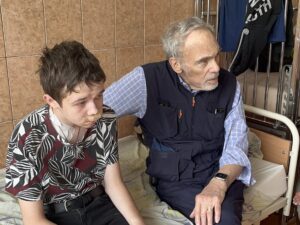
There’s more trouble ahead for this boy and millions of other children. Before the war broke out, Ukraine’s schools had been closed for about two years due to the pandemic. But then the war. Like too many Ukrainian children, Dmitri has not been attending a “normal” school for over three years.
I am wondering: how will Ukraine simultaneously fight a brutal war, start planning for recovery and think about dealing with the educational rehabilitation of millions of its youngest citizens? Karen reminds me that this young boy represents exactly why our new organization’s original mission was – and is – to focus on managing severe psychological trauma and providing educational support for children. We think about what this violent crisis will mean for Ukraine’s future.
I spoke with other kids and parents; their stories were like Dmitri’s. Unwanted, random disruption, trauma, and loss; the commonality of shared horror.
The next stop is a new “Youth Enrichment Center for Displaced Children and Youth” that UCAP is underwriting. We’ll be back for the ‘grand opening’ this fall.
Then Karen and the team head off to visit the leaders of another of our major partners, a Ukrainian organization building a new program and center for supporting displaced and orphan Ukrainian youth.
Sunday, July 2: Recovery Camps & Baez with displaced children -and on to the Capital
Another very busy day in Lviv visiting one of our favorite programs, the Recovery Camps of Lviv. These are magical places where children recently displaced from active war zones come for six days of supervised interactive games, song, dance, arts and crafts – and careful assessment of the degree to which they may have been psychologically traumatized. We met with the new full-time psychologist, supported by UCAP funding. She shows us the results of the new psychological trauma screening tool she implements in the camps. Bottom line? Some of the camps show that as many as 20% of the kids have symptoms of severe PTSD.
Joan meets dozens of children, mostly 5 to 15 years of age, in the sunshine of a beautiful summer’s day. They sing to her, and Joan sings to the kids. They are dancing and laughing – and finally surround Joan, enveloping her with hugs. An extraordinary moment.
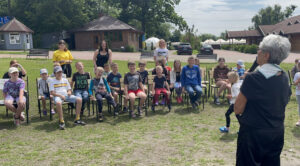
I spend as much time as possible talking to children and their moms, listening to heartbreaking stories of what they went through, what these kids had to see that may never be erased. They grieve. They cry. They miss the mundane, beautiful normalcy of childhood. So difficult to hear, but we hang in there with them, of course. I could have stayed there for days, but we need to get back to the hotel; need to pack and catch the evening train to the Capital.

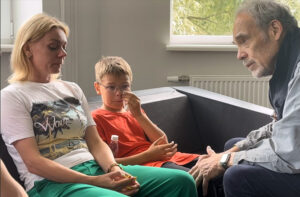
In Kyiv, we are met by a long-time “Zoom and WhatsApp” friend, Igor Novikov. Igor is fluent in English (and American culture) – and is a longtime senior advisor to President Zelenskyy and his government. And he is invaluable to us and finding our way through Ukrainian bureaucracies, ensuring that our time there is as productive and meaningful as possible.
Our agenda is packed. On the ride to the hotel from the train station, Igor points out some sites of interest, including Mykhailivska Square in the center of Kyiv. In the background are many beautiful modern and traditional buildings. But the square itself is filled with the burned-out carcasses of Russian tanks and armored vehicles of all kinds, And a single small car, too, riddled with bullet holes from a Russian attack that killed a family of four trying to escape the oncoming juggernaut is there, too, amidst the massive, now destroyed, Russian military vehicles. By the way, the Kyiv hotel we stayed in was a relatively new Hyatt with a rooftop outdoor bar/ restaurant overlooking a gorgeous cityscape. A city of extreme contrasts.
Monday, July 3: In Kyiv, meeting with officials & learning about Ukraine’s abducted children now in Russia
Another very busy day. One of the highlights was meeting with Mykola Kuleba, the founder and director of Save Ukraine, one of the country’s most successful and innovative programs supporting children. We first met Mykola in Washington, D.C., a few weeks ago in a meeting organized by one of the UCAPs most important partners, the American Federation of Teachers’ president, Randi Weingarten.
Save Ukraine has established a network of community centers supporting displaced and traumatized children. They have also been actively involved in helping children and families who are victims of the massive flood in Kherson following the still unresolved mystery of the dam that collapsed, leaving massive destruction and suffering in affected areas.
Save Ukraine also runs a major initiative focused on finding and retrieving kids kidnapped by Russia. Ukrainians are beyond frustrated and deeply distressed by Russia’s abduction and dispersal of as many as several tens of thousands of Ukrainian children. We will support efforts to accelerate efforts to return abducted children.
Karen also met with officials from the Ukraine Parliament, the Ministry of Education, and other Ukraine professionals working with children. Karen and her team from Columbia University have developed a state-of-the-art online program designed to help teachers learn how to manage children with severe psychological stress in their classrooms. Officials she has been meeting have committed to making the course available to teachers nationwide. Exactly what we had hoped for.
Tuesday, July 4: A very rough day in Borodianka
Igor takes us to Borodianka, a community some 40 miles northwest of Kyiv and about 70 miles from the Belarus border. The city had been occupied by Russian forces early in the war.
But before the occupation, the Russians intentionally and meticulously bombed virtually every residential apartment building with rockets, mortars, and artillery, aiming for the center of each standing building in the city. Thousands of civilians were killed here. We spoke to families.
An elderly grandmother caring for three young children weeps at what happened to her home. We visit the neighbor who tells us that we are standing less than three feet from where her own mom was killed. Russian occupiers took over homes, stealing or destroying every piece of furniture, every appliance. Soldiers took clothing and food. And they were unstoppable. The place reeks of sadness – but also a strong resolve of the people to defeat the Russians and drive them out of Ukraine.
This is the story everywhere we went and with virtually everyone we spoke with. Parents, teenagers, doctors, teachers, and government officials, at least for now, seemed to be determined to win this war and staunchly support Zelenskiy in this existential struggle.
And it was here, in the rubble which has purposefully not been cleared out, and with a bombed-out building as a backdrop, where Joan Baez sang John Lennon’s “Imagine.” Then she walked across the street, all of us trailing behind, where she spoke through Igor and Yuliia to survivors and, in the middle of the street, sang “Keep Your Eyes on the Prize,” the old protest song of political defiance – into which she inserted a verse in Ukrainian. We had no words then – and it’s still hard to describe Joan’s impact in a neighborhood semi-deserted town in this most war-torn place.
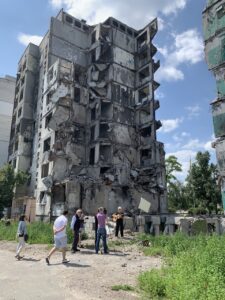
Wednesday, July 5/6: Cruise missile hits Lviv
The train schedule didn’t work, so we drove back to the Bank Hotel in Lviv – our favorite place to stay in that beautiful, lively city. We were exhausted when we arrived, but we planned to wake up early for a CNN interview that Joan and I were supposed to do live from the hotel.
But on that last night in Lviv, Russia had other plans. We had been sleeping for about an hour, and at about 2:15 AM, we heard the air raid sirens and an announcement in the hotel to head to the basement shelter. This was not the first time we had been in Ukraine when sirens went off, so we weren’t particularly concerned. Still, we usually would dutifully head to the shelter of wherever we were and wait it out.
But this time was very different. Igor sent me a message and called. “Irwin, take this seriously. Get your team down to the shelter. Russian cruise missiles have been launched from the South, and Lviv is the target.” That’s all we needed to hear. We met Joan and headed to the basement shelter, making our way through winding corridors and past hotel store rooms.
In the hallway, people were bringing out folding chairs. And we waited. In moments we started seeing and hearing the thunder of missile strikes. The building shook. We were pretty calm, but Joan was exhausted. She took her pillow into the laundry room and fell asleep on the floor. Other hotel guests were crying – but no panic. The alarm cleared after about two hours, and everybody returned to their rooms. At about 8:15 that morning, Joan, Karen, and I met on the outside deck of the hotel restaurant for the live CNN interview.
Bottom line? One of the missiles evaded Ukraine’s defense systems and struck an apartment building about a mile from the hotel. At least ten people died – and dozens were injured. This was the largest attack on civilian targets in Lviv since the war began.
Everything about this trip was extraordinary. And not just the missile attack and the visit to Borodianka. Also – perhaps especially – the people we met and the children and families who shared their stories with us will stay with us.
Here’s what’s become apparent to us after being in this remarkable many times this past year.
Despite regular missile and drone strikes in Kyiv or Lviv, the war is really focused on the east and south. That said, cities like Lviv and Kyiv, and the country in general, are incredible; beautiful classic European urban centers and suburbs where, for the most part, life goes on. Shops, universities, and restaurants are mostly open for business. Lots of folks in the streets. True that most of the shops and restaurants have emergency backup generators – and people know where the shelters are.
And also true that life around city hall in Lviv pauses regularly as processions and funerals for fallen soldiers are a regular occurrence. Yet, the people are resilient and determined. They are living their lives the best they can, even as the Lviv region and western Ukraine are inundated with displaced people escaping the horror of war in the east.
I know these contrasts of deadly war and resilience amidst beauty are hard to grasp. The war is indeed horrific, but Ukrainians are sustaining their spirit and even cautious optimism.
Still, I can’t help worrying about the many kids we alone can’t help and hope that every philanthropy helping these innocent victims of war will up their game and that the world’s nations figure out how to scale up assistance so that no child is left behind.
To learn more about the Ukraine Children’s Action Project, visit UkraineCAP.org
_________________________________________________________________________________________________________________
 Irwin Redlener
Irwin Redlener
(right) Irwin Redlener is a pediatrician, senior advisor to the Clinton Global Initiative’s Ukraine Action Network, and co-founder, with Karen, of the Ukraine Children’s Action Project (UkraineCAP.org). He is also co-founder with Karen – and singer/ songwriter Paul Simon – of the U.S. – based Children’s Health Fund. Dr. Redlener is the founding director of the National Center for Disaster Preparedness at Columbia University and a professor of pediatrics at the Albert Einstein College of Medicine.
Karen Redlener
(left) Karen Redlener is co-founder with Irwin of the Ukraine Children’s Action Project and co-founder of Children’s Health Fund. Karen was executive director of Children’s Health Fund’s New York Community Pediatric Program at Montefiore Medical Center and Albert Einstein College of Medicine from 1990 to 2015. She also served as a member of the NYC Board of Health from 2015 t0 2023.



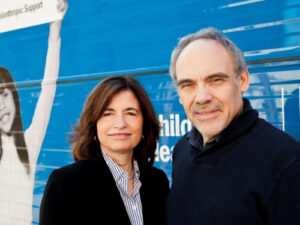 Irwin Redlener
Irwin Redlener


